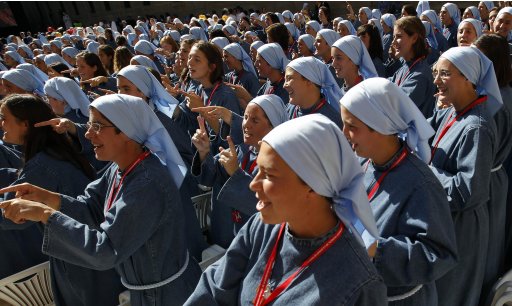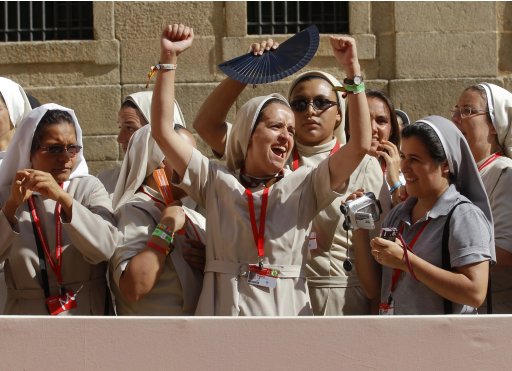 Pope Benedict XVI, centre, arrives at San Lorenzo del Escorial monastery in Madrid on Friday, part of a four-day visit for the Roman Catholic Church's World Youth Day festivities. (Arturo Rodriguez/Associated Press)
Pope Benedict XVI, centre, arrives at San Lorenzo del Escorial monastery in Madrid on Friday, part of a four-day visit for the Roman Catholic Church's World Youth Day festivities. (Arturo Rodriguez/Associated Press)Posted on 08/19/2011 8:38:25 AM PDT by NYer
 Pope Benedict XVI, centre, arrives at San Lorenzo del Escorial monastery in Madrid on Friday, part of a four-day visit for the Roman Catholic Church's World Youth Day festivities. (Arturo Rodriguez/Associated Press)
Pope Benedict XVI, centre, arrives at San Lorenzo del Escorial monastery in Madrid on Friday, part of a four-day visit for the Roman Catholic Church's World Youth Day festivities. (Arturo Rodriguez/Associated Press)
Pope Benedict XVI lamented modern society's "amnesia" about God as he travelled Friday to a famed Spanish monastery on the second day of his four-day visit for the Roman Catholic Church's world youth festival.
Several hundred young nuns cheered, waved flags and performed the "wave" at El Escorial monastery as they waited for Benedict inside a courtyard of a 16th-century complex, a UNESCO world heritage site about 50 kilometres northwest of the capital of Madrid.
Benedict told them their decisions to dedicate their lives to their faith was a potent message in today's increasingly secular world.
"This is all the more important today when we see a certain eclipse of God taking place, a kind of amnesia which albeit not an outright rejection of Christianity is nonetheless a denial of the treasure of our faith, a denial that could lead to the loss of our deepest identity," he said.
Benedict's main priority as Pope has been to try to reawaken Christianity in places like Spain, a once staunchly Catholic country that has drifted far from its pious roots.
He has travelled to Spain three times as Pope, an indication that he views it as the key battleground as he tries to remind Europe of its Christian heritage and the place he believes God should still have in everyday life.
That he chose to deliver his message in El Escorial is significant: The massive granite structure constructed by King Philip II in 1559 was his seat of power over a vast empire whose overwhelming international concern was defending the Catholic faith from what it considered the threat of Protestantism and the Reformation.
The building acted much like the White House and the Pentagon at the height of Spain's international power, throwing its weight and organizational ability behind the Vatican.
"This is a moment for unity and reflection; it's a spiritual awakening," said Sister Maria Sandoval, a 58-year-old nun who travelled from Medellin, Colombia, for the event.
Benedict later met with university professors at El Escorial, saying he was reminded of his own days as a young theologian at the University of Bonn in the years after World War II.
"At the time, the wounds of war were still deeply felt and we had many material needs," the 84-year-old German pontiff recalled. But he said those needs were taken care of by the "passion" he and his colleagues felt to respond to the heady questions about life and the search for truth posed by their students.
He urged the professors to not just educate today's young in the "technical ability" they may need to enter the workforce, but to guide them in pondering those loftier questions which he said embrace "the full measure of what it is to be human."
"We know that when mere utility and pure pragmatism become the principal criteria, much is lost and the results can be tragic," he said, adding: "From abuses associated with a science which acknowledges no limits beyond itself, to the political totalitarianism which easily arises when one eliminates any higher reference than the mere calculus of power."
His speech, dense and professorial as befits both speaker and audience, received a thunderous applause from the academics, who were decked out in their colorful tasseled caps and gowns in El Escorial's basilica.
His meetings, and a private audience with members of Spain's royal family Friday morning, came after a second relatively minor night of clashes between riot police and protesters opposed to his visit and the church's World Youth Day.
Four protesters suffered light injuries after riot police wielding truncheons forced several hundred people to leave Madrid's central Sol plaza on Thursday night, sending them scurrying through side streets with officers in pursuit. No arrests were made, said a police spokeswoman who spoke on condition of anonymity in keeping with department policy.
The demonstration was much smaller than a protest by 5,000 people on the eve of the Pope's visit for the youth festival. It also ended in violence when a smaller group clashed with police in Sol, resulting in more injuries and detentions.
Protesters have used Sol since May as the epicentre of their rage against Spain's political establishment, the government's anti-austerity measures and unemployment of nearly 21 per cent, a eurozone high.
They also are angry about the $72-million US tab for staging World Youth Day as Spain struggles economically.
The church says the weeklong festival is being paid for by participants, donors and the church, but pilgrims are staying for free in government buildings and getting deeply discounted subway and bus tickets, while public transport fees were raised significantly for everyone else this month.
As he arrived Thursday, Benedict offered words of encouragement to young people facing precarious futures because of the economic crisis, calling for policy makers to take ethical considerations that look out for the common good into account when formulating economic policy.
Later Friday, he will have lunch with a dozen young World Youth Day volunteers, meet with the prime minister and then participate in the Way of the Cross procession re-enacting Christ's crucifixion and death — a staple of the Catholic youth fests inaugurated over a quarter century ago by Pope John Paul II.


Nuns sing as they wait for Pope Benedict XVI's departure from the monastery of El Escorial in San Lorenzo de El Escorial, near Madrid, on the second day of his four-day visit to Spain coinciding with the World Youth Day festivities, August 19, 2011.
|
|
From the Holy Father's message:
Dear Sisters, every charism is an evangelical word which the Holy Spirit recalls to the Church’s memory (cf. Jn 14:26). It is not by accident that consecrated life “is born from hearing the word of God and embracing the Gospel as its rule of life. A life devoted to following Christ in his chastity, poverty and obedience becomes a living ‘exegesis’ of God’s word… Every charism and every rule springs from it and seeks to be an expression of it, thus opening up new pathways of Christian living marked by the radicalism of the Gospel” (Verbum Domini, 83).
This Gospel radicalism means being “rooted and built up in Christ, and firm in the faith” (cf. Col 2:7). In the consecrated life, this means going to the very root of the love of Jesus Christ with an undivided heart, putting nothing ahead of this love (cf. Saint Benedict, Rule, IV, 21) and being completely devoted to him, the Bridegroom, as were the Saints, like Rose of Lima and Rafael Arnáiz, the young patrons of this World Youth Day. Your lives must testify to the personal encounter with Christ which has nourished your consecration, and to all the transforming power of that encounter. This is all the more important today when “we see a certain ‘eclipse of God’ taking place, a kind of amnesia which, albeit not an outright rejection of Christianity, is nonetheless a denial of the treasure of our faith, a denial that could lead to the loss of our deepest identity” (Message for the 2011 World Youth Day, 1). In a world of relativism and mediocrity, we need that radicalism to which your consecration, as a way of belonging to the God who is loved above all things, bears witness.
This Gospel radicalism proper to the consecrated life finds expression in filial communion with the Church, the home of the children of God, built by Christ: communion with her Pastors who set forth in the Lord’s name the deposit of faith received from the apostles, the ecclesial Magisterium and the Christian tradition; communion with your own religious families as you gratefully preserve their authentic spiritual patrimony while valuing other charisms; and communion with other members of the Church, such as the laity, who are called to make their own specific calling a testimony to the one Gospel of the Lord.
Finally, Gospel radicalism finds expression in the mission God has chosen to entrust to us: from the contemplative life, which welcomes into its cloisters the word of God in eloquent silence and adores his beauty in the solitude which he alone fills, to the different paths of the apostolic life, in whose furrows the seed of the Gospel bears fruit in the education of children and young people, the care of the sick and elderly, the pastoral care of families, commitment to respect for life, witness to the truth and the proclamation of peace and charity, mission work and the new evangelization, and so many other sectors of the Church’s apostolate.
I like the disclaimer from Archbishop Chaput. May I borrow it?
If it's OK with his excellency, it's OK with me :-)
Disclaimer: Opinions posted on Free Republic are those of the individual posters and do not necessarily represent the opinion of Free Republic or its management. All materials posted herein are protected by copyright law and the exemption for fair use of copyrighted works.